Spring 2023

Read inside

From healing to independence: empowering women in Ethiopia with fistula injuries to lead independent lives.




International Women’s Day Ambassadors’ Visit
 © Mary F. Calvert
© Mary F. Calvert
Ending fistula in Ethiopia. Forever. hamlinfistulauk.org
Welcome to the Spring edition of Emaye
One operation can repair a fistula. But that’s not the end of the story.


A childbirth injury can have a devastating impact on a woman’s life. Not only are the patients at Hamlin Fistula Ethiopia su ering the devastation of having experienced a stillbirth and a traumatic injury, in many cases women are then divorced by their husbands, abandoned by their families and even cast out by their communities.
Beyond the physical mending of scars and injury, our rehabilitation programme enables hundreds of fistula survivors each year to gain independence, learn new skills and prepare to reintegrate into their community on their return home.
Our aim is to instil women with a sense of worth and empowerment so they can live independently and, most importantly, with dignity and choices. We want women to reintegrate and be active members of their community, with a sustainable income, respect and personal empowerment.
In this edition of Emaye we shine a light on the impact of our rehabilitation programme and hear from our counsellors, trainers and patients themselves – including Mulu –who shares how she has reclaimed her life, armed with restored health and incomegenerating opportunities.
The compelling simplicity of Hamlin Fistula’s mission and rehabilitation programme has been close to my heart since I became aware of this important work almost two decades ago.
I find it both incredibly humbling and moving to be involved and play my part as a Trustee today. As I write, I am reflecting on the life of my maternal grandmother, my “Emaye”, on the anniversary of her death a year ago. She had eight children who lived to adulthood but gave birth sixteen times, losing many babies in early infancy. She didn’t su er obstetric fistula, but her life was impacted by poor birth outcomes and the harsh reality of giving birth without expert medical care. For these reasons it
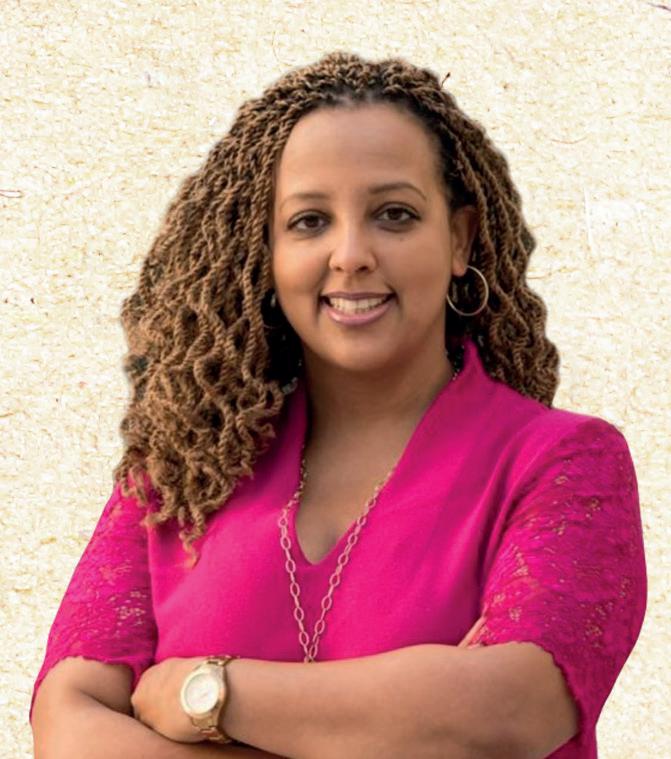
is especially meaningful to me to ensure that Hamlin’s rehabilitation programme continues to go from strength to strength. Finally, we were also honoured to recently celebrate International Women’s Day by welcoming a group of seven Ambassadors to Ethiopia and their representatives to the Addis Ababa Fistula Hospital. Hamlin Fistula Ethiopia CEO Tesfaye Mamo shares more about this special visit on page 6. This work wouldn’t be possible without your support - from all of us at Hamlin, thank you.
Hewete Haileselassie Trustee Hamlin Fistula UK


Email info@hamlinfistulauk.org
Phone 0121 559 3999


Web hamlinfistulauk.org

@HamlinFistulaUK
@HamlinFistulaUK
@hamlinfistula_uk
B62 9JJ.



Hamlin Fistula UK is a registered Charity No. 1153053. Registered as a Company Limited by Guarantee in England & Wales No. 08457433. Registered o ce at 4 Parade Buildings, Nimmings Road, Halesowen,
2 2
From healing to independence
Our rehabilitation programme
Through our rehabilitation programme, we provide counselling, physical therapy and livelihoods training to women before and after surgery for childbirth injures.
The programme is designed to support women to reintegrate into their villages and be active members of their community with a sustainable income, respect and personal empowerment.
Across all our hospitals, your donations are providing:
Psychosocial counselling and therapy

Emotional wounds for patients are often less visible and can take a long time to heal. We provide one-to-one counselling, group therapy and spiritual support, enabling patients to cope better and adjust to their everyday life after treatment for childbirth injury.
Education and skills training
We restore women’s self-esteem and ability to generate their own incomes on their return home through o ering numeracy and literacy classes as well as handicrafts training.
Community reintegration
For patients with a longerterm recovery journey we o er residential rehabilitation. At our Desta Mender centre each woman has an individualized plan developed by a team of specialists. This can include business skills training courses and provision of seed money to set up a business and reintegrate into their communities when they return home.
Zewditu, pictured above, manages rehabilitation education for patients at the Addis Ababa Fistula Hospital and at Desta Mender.
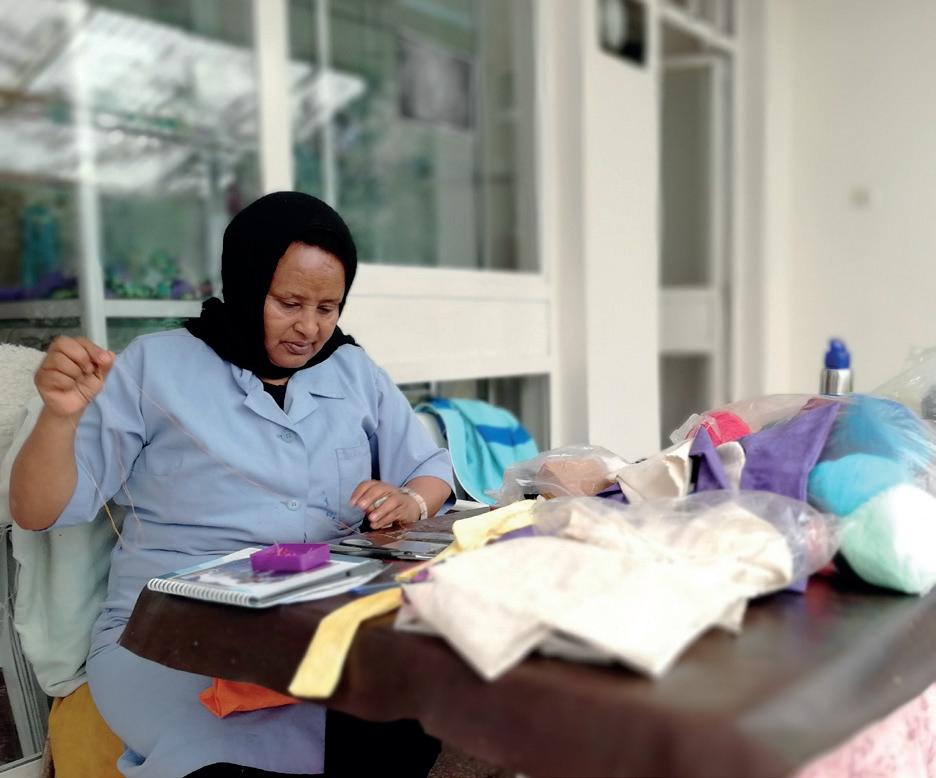
She ensures women are taught skills, such as embroidery, that can be learnt during their recovery and that they can carry on using when they are discharged home, to support themselves and make an income. She teaches in the hospital’s dedicated classrooms, and for patients that can’t leave the wards materials are taken to them so they can continue to take part and be included in the group.
There is a small shop at the hospital where women have the opportunity to sell the things they make. Each woman receives the money for her items sold in the shop.
Zewditu smiles as she tells us:
“Most often women buy a mobile phone with their earningssometimes their first ever phone.”
3
Meet Zewditu Rehabilitation Activities Manager
Changing Lives
at Dester Mender Rehabilitation Centre


Dr Catherine Hamlin knew that surgery was just the start of a woman’s healing. . . so she built a ‘Village of Joy’ to bring hope for the future.
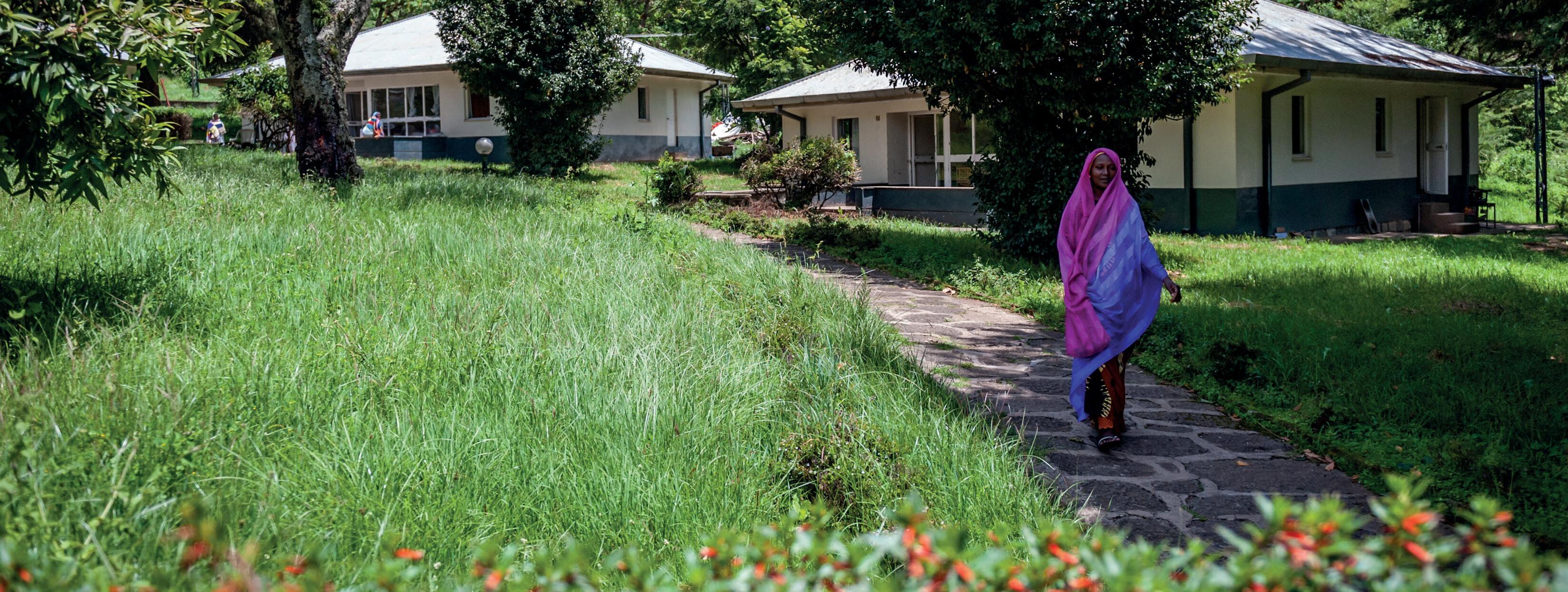
The su ering caused by obstetric fistula goes far by beyond the physical impact. Women are often subject to severe social stigma and cast out from their families and communities. They lose their confidence, relationships and ability to earn a living. They can find themselves living in poverty, isolated and alone.


Dr Catherine Hamlin believed that treating an obstetric fistula patient isn’t just treating a hole in the bladder, but rather the whole woman with love and care. She knew that surgery was just the start of a woman’s journey to healing.
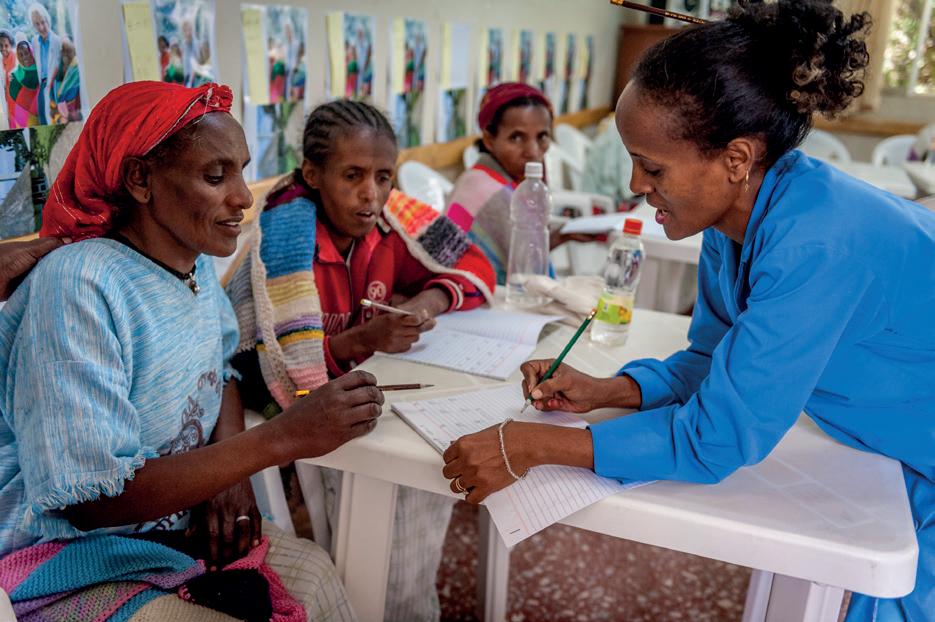
“We don’t just treat a hole in the bladder, we treat the whole patient with love and tender care, literacy and numeracy classes, a brand new dress and money to travel home,” said Dr Catherine Hamlin


So in 2002 Catherine established Desta Mender, which means ‘Joy Village’ in Amharic. Desta Mender is a recovery centre where longer-term fistula patients with more severe injuries can continue to heal. It has market gardens, an orchard and dairy farm as well as the Juniper Café where residents learn hospitality skills.
Each woman staying at Desta Mender has a tailored rehabilitation and reintegration programme. Women are o ered counselling, literacy and numeracy classes. Training ranges from farming skills and pottery, to catering and business skills. In some cases, our support also includes provision of startup grants to enable women to establish their own businesses on their return home and rebuild their livelihoods. It enables them
4
© Mary F. Calvert
Empower Women, Empower Communities
Recently, Desta Mender launched a new Women’s Empowerment Programme. With the support of Swiss charity Women’s Hope International, this new initiative empowers women to live with choices and independence – in turn empowering their community and those around them. Under the guidance of skilled instructors, the Women’s Empowerment Programme provides a range of opportunities, including leadership and communications training, as well as small-business guidance and vocational training.
The first two groups of women have completed this inspiring programme. They have returned home with new skills that will have a positive impact on their lives and communities. They are empowered to regain self-worth, earn an income and create a new life beyond poverty, pain and persecution.
“The team at Hamlin has not only brought me out of darkness, but has provided me with skills and support to make life easier. How can I express my gratitude?”
Medina, a patient at Desta Mender.
Mulu’s story


At just 26, Mulu had already spent over one third of her young life in agony with a fistula injury. After an operation at her local hospital failed, she thought she’d never get help – but then she found Hamlin’s Bahir Dar Fistula Hospital, and last year, Mulu was cured.
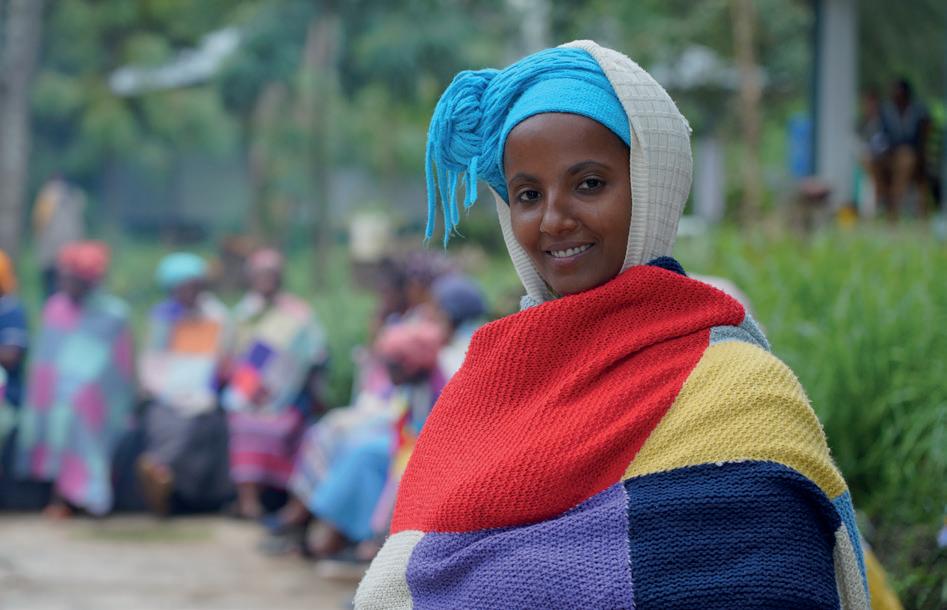
You may think this was her happy ending. But as thankful as Mulu was for her surgery, she returned home with no skills or income to support herself or her family.
Like Mulu, many fistula patients found it hard to make a living even before they su ered a fistula injury. Growing up in extremely poor areas, they never had the chance to go to school or learn skills to earn an income. A fistula injury leads them
deeper into a life of destitution and despair. Thanks to the kindness of people like you, Mulu received training in literacy, numeracy, and small business skills as part of the Women’s Empowerment programme.
“The best thing about the Women’s Empowerment Programme training was learning practical skills and sharing with others. They were very unforgettable colourful days and happy moments for me.”
Mulu’s creativity and entrepreneurial spirit were supressed by her years living with fistula. But her training at Desta Mender soon brought them out. She made handicrafts while at Desta Mender, then sold them to buy materials for her dream business.
“I want to start my own small inn, snack corner and lead an independent life with my own income,” she said.

Mulu used her newfound business skills and literacy skills to apply for a working space. Now, at age 27, she’s building up her little local restaurant and teaching her children how to save money.
This exciting new initiative is only possible thanks to the support of generous donors around the world. Thank you for helping to make this programme possible.
5
“I am so thankful and happy!”
*Names have been changed to protect the identities of
we help
Mulu, pictured at Desta Mender.
those
Spotlight on International Women’s Day Ambassadors’ Visit






Over the years, Hamlin has been honoured to welcome many important visitors to our hospitals, from Her Royal Highness Princess Anne to US chat show host Oprah Winfrey.
High profile supporters play a vital role in helping to spread awareness of our work and the importance of women’s health care in Ethiopia around the world. This Spring, to celebrate International Women’s Day, we were honoured to host a very special visit from Ethiopia’s community of International Ambassadors to introduce them to our work.
Representatives from seven countries and the European Union joined the team at the Addis Ababa Fistula Hospital to meet with surgeons, tour the hospital and talk with recovering patients.

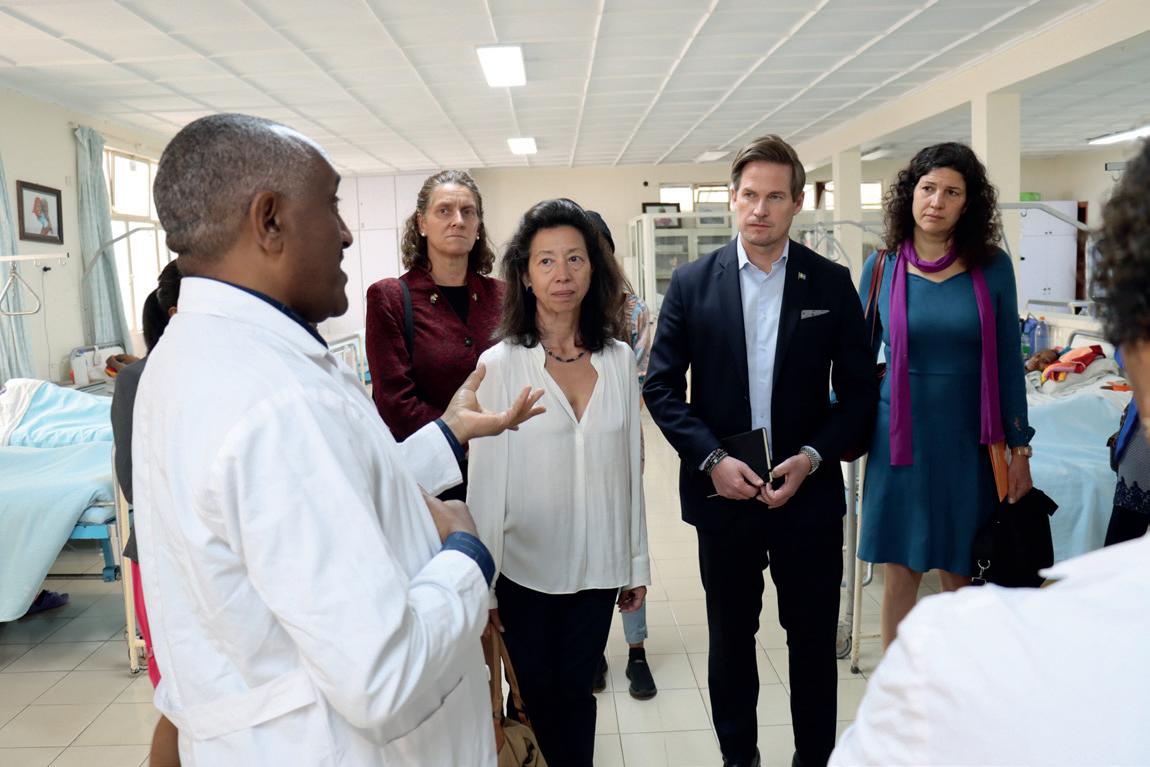
Suzanne Mandong from the United Nations Population Fund, a close partner to Hamlin, supported the visit, which welcomed ambassadors to Ethiopia from Austria, Japan, Sweden, Greece and the European Union as well as attachés and

representatives from Canada and Australia. Our CEO in Ethiopia, Tesfaye Mamo, presented Hamlin’s strategy to end fistula in Ethiopia and explained how this can only be achieved with the support of our donors around the world and a coordinated approach in Ethiopia.
Tesfaye said:



“It was such an honour to welcome so many distinguished guests to Hamlin. Their support makes a huge difference in raising awareness internationally of the work we are doing to eliminate obstetric fistula from Ethiopia. The Ambassadors were also keen to know more and extend support to our forthcoming Project Zero
6
Pictured below: Hamlin Medical Director, Dr Yeshineh talks with some of the visiting ambassadors.
Project Zero
The road map for a fistula-free Ethiopia

We are excited to let you know that Hamlin Fistula Ethiopia has just begun the pilot for a brand new, ground-breaking initiative -
Knit for Hamlin
The colourful blankets that all patients at our hospitals are given on their arrival have come to be a symbol of the care and comfort that women receive at Hamlin. But did you know that they are nearly all knitted by dedicated knitters from across the UK?

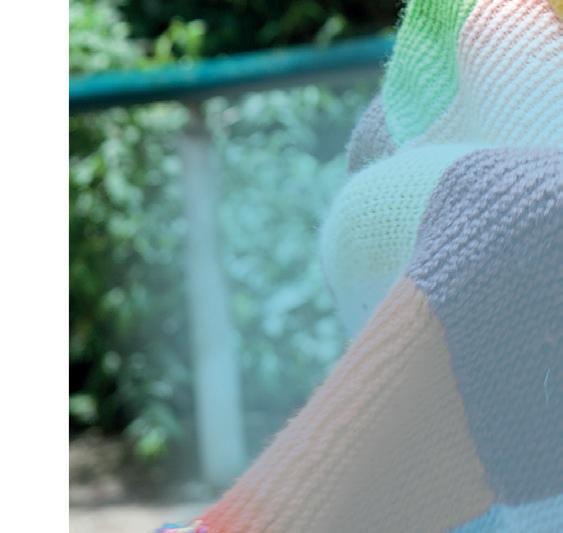
Individual knitters and groups such as Knit and Knatter, Inner Wheel and Soroptimist Clubs knit the blankets which are then sent on to Ethiopia, where they become treasured items for our patients.

Last year, thanks to the hard work of our volunteers we were able to send 1,757 blankets to Ethiopia, as well as a large number of baby cardigans.
Project Zero is an ambitious yet achievable programme that will use a woreda-byworeda (district by district) approach to eradicating fistula in Ethiopia.

Hamlin-trained teams will work with local health bureaus and other stakeholders to visit every household in both rural and urban areas, to find women living with an obstetric fistula injury and organise care and treatment. This will be alongside strengthening maternal healthcare services within Ethiopia, to reduce the incidence of birth injuries, and a national education campaign will give women the tools and knowledge they need to give birth safely. We look forward to sharing more details of this exciting project later in the year.
We need 3,000 blankets for patients with surgeries planned over the next year. If you are a keen knitter, or know someone who is, please consider knitting for Hamlin. For more information visit hamlinfistulauk.org/knit



7
Join us to Walk with Ethiopian Women and raise vital funds to help restore the health, happiness and livelihoods of women across Ethiopia.
Each year thousands of women in Ethiopia who have su ered devastating childbirth injuries walk or are carried vast distances to reach vital health care. You can help these women get the life-restoring treatment and care they need.

Challenge yourself and walk in solidarity with Ethiopian women. The money you raise will provide life changing treatment and care for women with childbirth injuries across Ethiopia.
Set your Challenge

Walk solo or as a team, set a goal and go at your own pace. Visit us at hamlinfistulauk/walk
Spread the word
Ask family and friends to support you by donating on your fundraising page.
Strive for your goal
Walk with Ethiopian women. . . your steps will change lives!

By Phone 0121 559 3999 Get involved. . .
“Our country is very mountainous and it’s difficult to traverse. The average walk for our patients is two days to the main road and so their difficulties are enormous.” Dr Catherine Hamlin






 © Mary F. Calvert
© Mary F. Calvert












































